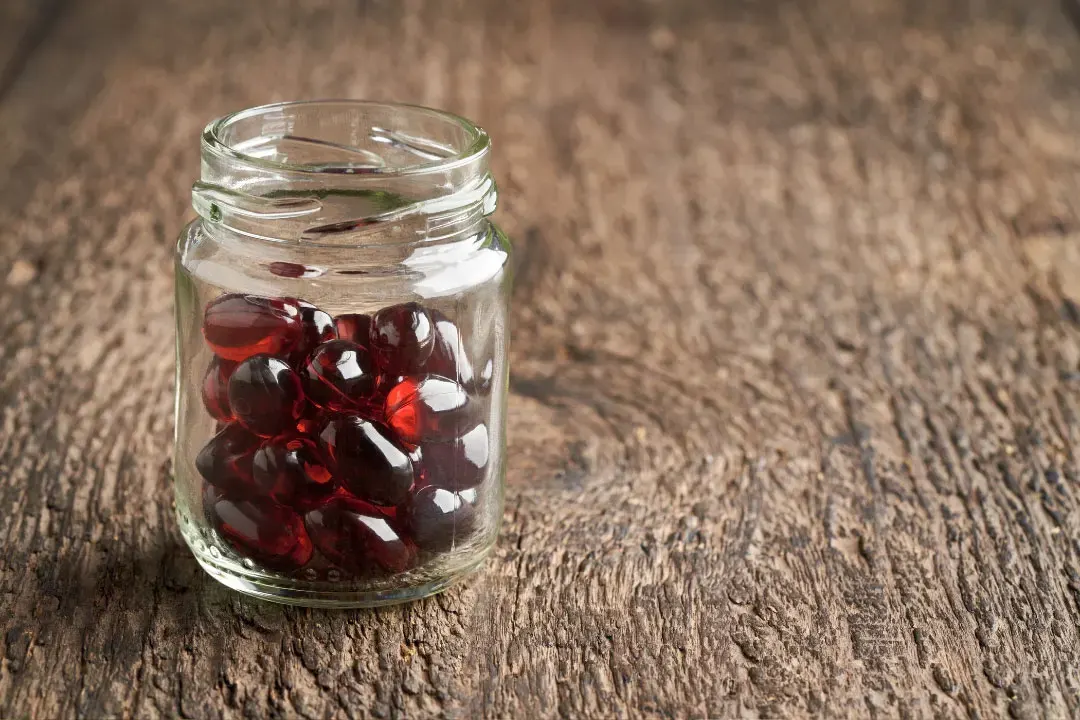Krill oil packs bioavailable omega-3 fatty acids that confer major health benefits. In general, adults should aim for at least 250-500 milligrams of seafood-based omega-3 fatty acids per day. Discover how to find the perfect krill oil dosage, avoid safety risks, and maximize your wellness benefits.
Life under the sea holds a treasure trove of omega-3 fatty acids, capable of extending and enhancing the quality of our lives. Unfortunately, 95% of adults do not get the recommended amount of seafood and omega-3 fatty acids in their diet. Fish oil can be a tough pill to swallow, but the right krill oil dosage can strengthen your heart, brain, bones, and immune system.
You May Also Like:
What’s the Best Chromium Supplement? Top 5 Products Reviewed.
Healthy Truth’s Organic Superfood Energy Squares Are Our Top Choice of Superfood Snacks
Krill Oil Dosage, Benefits, & Safety is an original (NewsHealthWatch) article.
Krill oil benefits
Have you ever wondered why whales, some living up to 200 years, enjoy such lengthy lifespans? One of the key factors is their diet, primarily composed of krill—a tiny crustacean found in the ocean. In fact, the term ‘krill’ comes from the Norwegian word for whale food. For instance, the blue whale feeds on approximately 4 tons of these crustaceans daily. Fortunately, humans can achieve satisfactory and thriving results with a much smaller krill oil dosage.
Krill oil contains the same fatty acids as fish oil but without the fishy aftertaste. It’s a great source of docosahexaenoic acid (DHA) and eicosapentaenoic acid (EPA), which are omega-3 fats exclusively found in marine sources. These fats provide essential health benefits, including:
- Promotes heart health: A krill oil dosage of just 1 to 3 grams helps lower cholesterol and triglyceride levels and reduces blood pressure, thus mitigating the risk of a heart attack or stroke.
- Helps alleviate arthritis and joint pain: Studies have shown that taking 2 grams of krill oil per day helps relieve knee joint pain, outperforming a placebo in participants with mild knee pain. The anti-inflammatory properties of krill oil often work much better than prescription medications to reduce symptoms of both osteoarthritis and rheumatoid arthritis.
- Strengthens bones: The omega-3 fatty acids in krill oil help prevent calcification and bone decay while promoting bone formation. Many orthopedic specialists recommend omega supplements to stave off osteoporosis.
- Improves circulation: A krill oil dosage of just 3 grams a day helps improve blood circulation by facilitating the movement of platelets and reducing the likelihood of clot formation.
- Improves brain function: The DHA and EPA found in krill oil are crucial for memory, cognitive ability, and blood flow in the brain. They’re essential for brain development in infants and contribute to reducing the risk of Alzheimer’s disease in older adults.
- Helps with eye problems: Krill oil has been proven to reduce inflammation and improve symptoms of dry eyes. The astaxanthin found in krill oil can help reduce eye fatigue often associated with excessive screen time. This antioxidant is not found in fish oil.
- Promotes healthier skin: The omega fatty acids found in krill oil help restore moisture to the skin, combating dryness that leads to itching and wrinkles.

The optimum krill oil dosage
Doctors recommend that healthy adults consume between 250–500 mg of combined EPA and DHA each day. Therefore, determining the right krill oil dosage you need as a supplement depends largely on your diet. If you consume salmon, tuna, or sardines twice a week (although few people do), you can make do with a smaller dose. Age also factors into determining the krill oil dosage. Babies need only half a gram of omega-3 fats each day, whereas adolescents and adults will benefit from 1.5 grams a day.
Individuals with poor cardiac health and high blood pressure may consider a higher krill oil dosage. Psychiatrists sometimes recommend taking a daily supplement containing 2 grams or 2,000 mg of omega-3 fatty acids to combat depression. Generally, your body can handle up to 5 grams of omega-3 fatty acids with relatively few side effects.

Possible risks of krill oil
While the benefits of krill oil outweigh those of fish oil, there’s also the possibility of side effects, including:
- Allergies: If you have a seafood allergy, particularly to crustaceans, steer clear of krill oil. Krill could trigger allergic reactions such as a rash and tightening of the throat.
- Acts as a blood thinner: The properties that benefit people with blood clots can be dangerous for those taking blood thinners.
- Could lower blood pressure: While this is beneficial for individuals with hypertension, it poses a risk for those with consistently low blood pressure. In such cases, it may be advisable to avoid even the smallest krill oil dosage.

Options for the optimum krill oil dosage
You would have to eat a lot of seafood, chia seeds, and nuts to get the recommended daily amount of omega fatty acids. This is why most doctors recommend taking a krill oil supplement. Kori Krill Oil offers 1200 mg softgels that measure the krill oil dosage for you. Each softgel contains 250 mg of omega-3, EPA, and DHA, along with choline, another essential nutrient that supports brain, liver, and nervous system health.
Many Americans start taking fish oil as they age and begin realizing the importance of adding omega fatty acids to their diet. However, Kori Krill Oil’s chief executive Nancy Chan aims to reverse this trend by targeting the next generation. “What many consumers don’t realize is that omega-3s are essential nutrients that go beyond heart health,” she states. “They’re a multi-benefit supplement that can help your brain, joints, eyes, skin, and immune system. So our goal is to convince millennials to start thinking about their health now.”
Both older and younger customers have provided excellent online reviews for Kori Krill Oil, with some touting the health benefits and others praising the company for its sustainable and earth-friendly practices.

Food for thought
Krill oil may cost a little more than fish oil, but avoiding that fishy aftertaste (and fishy breath) may be worth it. Fish oil can also cause bloating and gas—something you won’t have to worry about with krill oil. You don’t have to consume 4 tons of this life-saving crustacean a day to reap the benefits. Instead, consider a krill oil dosage of between 250 and 500 mg for optimal health.
Further reading for additional reference:
National Institutes of Health: Omega-3 Fatty Acids
Harvard.edu: Omega-3 Fatty Acids: An Essential Contribution
Cleveland Clinic: A Look at Krill Oil’s Benefits
Important Note: The information contained in this article is for general informational purposes only, and should not be construed as health or medical advice, nor is it intended to diagnose, prevent, treat, or cure any disease or health condition. Before embarking on any diet, fitness regimen, or program of nutritional supplementation, it is advisable to consult your healthcare professional in order to determine its safety and probable efficacy in terms of your individual state of health.
Regarding Nutritional Supplements Or Other Non-Prescription Health Products: If any nutritional supplements or other non-prescription health products are mentioned in the foregoing article, any claims or statements made about them have not been evaluated by the U.S. Food and Drug Administration, and such nutritional supplements or other health products are not intended to diagnose, treat, cure, or prevent any disease.

